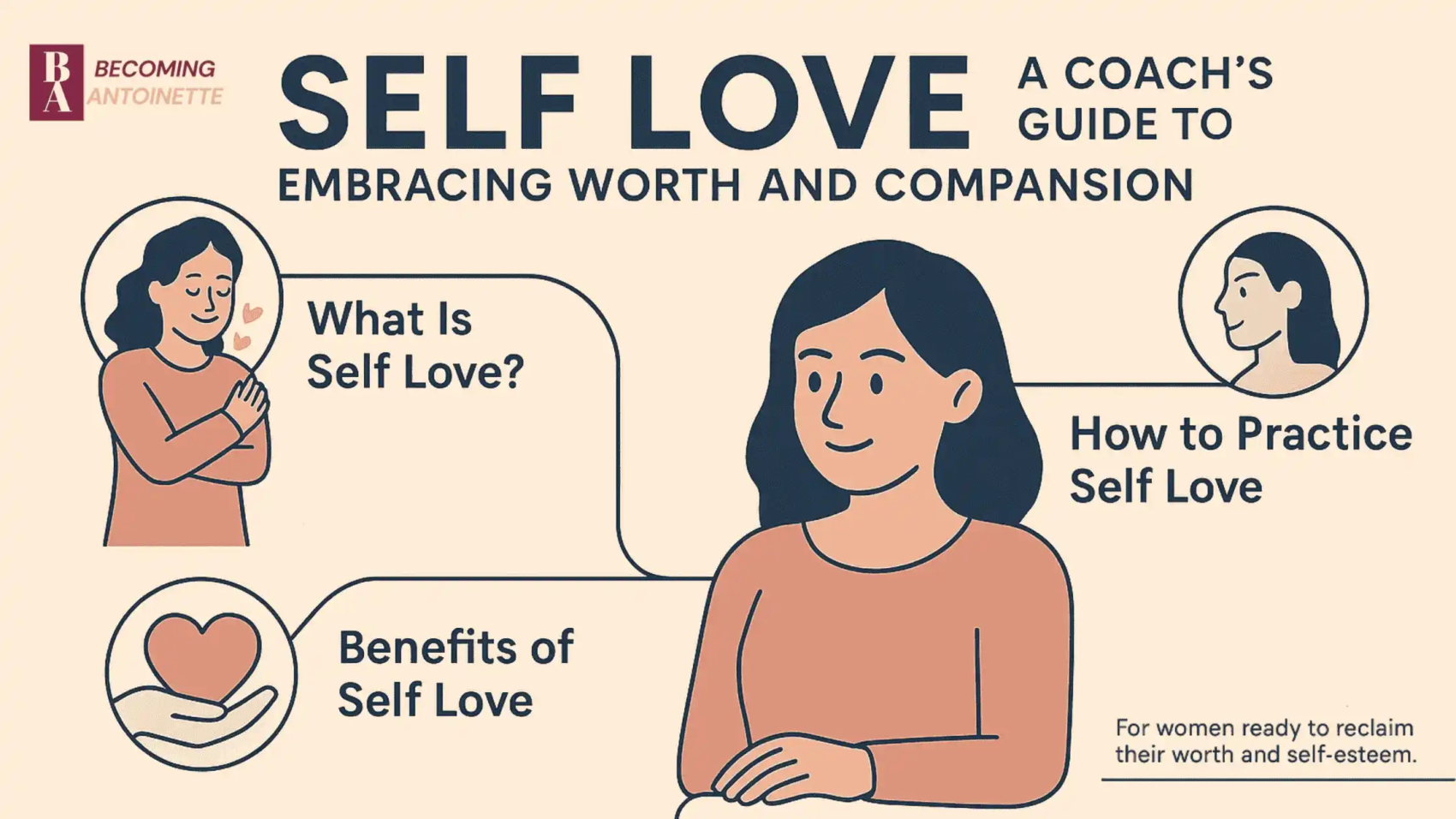I have had my share of challenges with my inner critic which led me to doubt my skills and self Love. In the journey that followed, I learned that ‘self love’ is much more than a buzz word. It is the key ingredient that guarantees sustained happiness and wellbeing. In this guide, I will provide insights from my struggles alongside practical steps from my coaching sessions so that you can fully unravel the meaning of self love. You will walk away with a defined action plan, impactful activities, and an insight into the manner self love can reshape your mental wellbeing, relationships, and self-esteem.
What Is Self Love?
Defining Self Love
Early in my career, I coached Mia, a high achiever who equated worth with performance. I taught her that Self Love means embracing your whole self—strengths, flaws, and all—with patience. When Mia learned to replace “I must be perfect” with “I’m growing,” she experienced a profound shift in how she viewed herself.
Also Read: What Does Self Love Mean? 7 Surprising Ways to Practice It Daily
Self Love vs. Self-Esteem
I often explain that self-esteem depends on external validation, but it is an unwavering belief in your value. In sessions, I use a “confidence compass” tool: when clients wobble after criticism, they recalibrate by recalling three personal achievements. This practice cements Self Loving as their true north.
Related: How I Learned Self Love vs Self Esteem: Messy, Real & Unfiltered
How to Practice Self Love
Daily Habits I Recommend
Each morning, I teach clients to look in the mirror and declare, “I honor my journey and believe in my worth.” At first, my own reflection looked back with skepticism—but after 14 days, I noticed a warmth in my gaze. I also encourage setting a digital boundary: do not work after 7pm to signal your brain it’s time for self-care.
Personalized Journaling and Affirmations
With my client Sana, I introduced a “letter from your future self” exercise. She wrote to present-day Sana, celebrating upcoming wins and reminding herself of her resilience. This tool, adapted from positive psychology research at the University of Pennsylvania, helped her rebuild confidence from the inside out.
Read full: How to Practice Self Love: A Real Guide
Benefits of Self Love
Emotional Resilience
When my coaching business hit financial turbulence, I applied my own techniques. Instead of panic, I journaled three lessons from the setback, then brainstormed solutions. That approach kept me calm and solution-oriented.
Holistic Well-Being
The Mayo Clinic reports that self-care routines lower stress hormones and improve sleep quality. In my practice, women share how they traded restless nights for restful sleep within two weeks of implementing nightly gratitude rituals.
Increased Motivation
I’ll never forget Leila’s message: “Your exercises reignited my passion for writing.” By prioritizing her well-being first, Leila unlocked a creative well she thought was lost.
Self Love Exercises
Reflective Mirror Work
Every evening, I stand before my mirror, place my hand on my heart, and whisper, “I am enough.” My client Noor told me this felt strange at first, but within days it became a comforting ritual that grounded her before sleep.
Gratitude and Growth Lists
I ask clients to create dual lists: five things they’re grateful for and five ways they’ve grown in the past month. This dual approach enhances self-awareness and compassion, reinforcing both Self Love and self-esteem.
Centering Breath Practice
During a panic episode, I lead clients through a 4-7-8 breathing exercise—inhale for 4 counts, hold for 7, exhale for 8. Clinically proven to reduce anxiety, this technique anchors you back to your body and your practice of Self Love.
Self Love and Mental Health
Why They’re Intertwined
In my years of coaching, I’ve witnessed self-compassion catalyze mental health breakthroughs. The American Psychological Association highlights how self-compassion lowers depression risk, a finding I integrate into every coaching module.
When to Seek Professional Help
While coaching excels at habit-building, sometimes professional therapy is necessary. If you struggle with persistent distress, the National Institute of Mental Health offers guidance on finding licensed therapists.
Building Self-Esteem
Celebrating Micro-Wins
I encourage clients to deposit a marble in a vase for each small victory—making a healthy meal, setting a boundary, or speaking up at work. Over time, the full vase visualizes their growing self-esteem.
Expert-Level Self-Talk Techniques
I share scripts that shift language from blame to empowerment. Instead of saying “I always mess up,” you learn to affirm, “I’m learning from every experience.” This linguistic shift rewires your inner dialogue toward positivity.
Self Love and Relationships
Establishing Boundaries with Confidence
I once coached Priya to say, “I’ll join you next time—today I’m focusing on rest.” By honoring her needs gently but firmly, her relationships deepened and became more respectful.
Modeling Respect to Others
When you demonstrate self-respect, you set a standard. In my workshops, I’ve seen partners and friends respond with increased support when women consistently prioritize their well-being.
Self-Compassion
Core Principles
At the core of Self Love lies self-compassion. I guide clients through the “Treat Yourself Like a Friend” exercise—imagining they’re offering kindness to someone they love—to cultivate warmth toward themselves.
Advanced Exercises
One powerful coaching method I use is the “compassionate mentor” prompt: write guidance as though you’re coaching your own best friend. Clients often report this shifts self-criticism into constructive counsel.
Overcoming Self-Doubt
Tracking Your Triggers
I provide a “doubt diary” template where clients log moments of self-doubt—what triggered it and how they responded. Reviewing entries reveals patterns and empowers preemptive practice of affirmations.
Reframing with Expert Guidance
During sessions, I employ Socratic questioning to challenge limiting beliefs: “What evidence contradicts this thought?” This approach, grounded in cognitive behavioral therapy, dismantles doubt brick by brick.
How to Start Self Love
Crafting Your Personalized Routine
In our discovery session, I work with you to blend brief morning rituals, midday check-ins, and evening reflections—ensuring Self Love integrates seamlessly into your unique lifestyle.
Accountability Partnerships
In my group coaching circles, women form accountability pairs, sharing daily checkpoints via text. This supportive structure elevates commitment and transforms intentions into habits.
You may also read: How to start Self Love Journey
Coaching Support
I offer one-on-one coaching designed specifically for women who are ready to reclaim their worth. It isn’t just coaching—it’s a guided transformation rooted in my own lived experience. Let’s start building the life you deserve. Contact me today!
FAQs
What is meant by self-love?
Self-love is about treating yourself with the same kindness, care, and compassion you would give to your nearest and dearest friend. This mean appreciating your value even without achievement, giving grace for errors, and caring for your emotions and body.
Why is self-love so difficult?
Self-love becomes extremely challenging because we are often our own harshest critics. This struggle comes from setting unrealistic standards for oneself, unhealthy comparisons, concentrating on perceived weaknesses, and overlooking strengths. In addition, many people do not receive education beyond basic care routines on how to genuinely tend to themselves. Self-love requires effort just like any other skill would.
What if I don’t love myself?
Self-hatred is a common and painful problem that tends to lead to more difficulties such as addiction, eating disorders, and self-harm. Still, through committed action, it can be turned into self-love.


Leave Your Comment